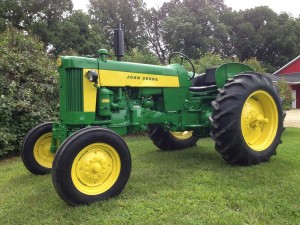Buyer Beware: What to Look for when Purchasing an Antique Tractor
 Tractor enthusiasts are generally wonderful people. The vast majority are honest and friendly, the salt-of-the-earth folks that you can be confident doing business with.
Tractor enthusiasts are generally wonderful people. The vast majority are honest and friendly, the salt-of-the-earth folks that you can be confident doing business with.
But every now and then, you’ll run into a seller who isn’t so upstanding. My dad and I have bought thousands of tractors over the years, and we’ve learned the hard way about many tricks that dishonest sellers will use to cover up serious mechanical issues in their tractors. Here, we share seven of the most common tricks – and how to see right through them. 
- A turned-up oil pressure gauge. A dishonest seller can fiddle with the readings on the gauge to make the tractor show great pressure when the pressure is actually quite low. To fight against this, pay careful attention to the amount of smoke the tractor gives off. Excessive smoke can be the warning sign of a worn-out engine.
- A lowered oil level. If the engine smokes, a seller can try to mask this by lowering the overall oil level – with less oil in the engine, the tractor won’t smoke as bad. Checking the oil level can help make sure you are getting an accurate representation of the tractor’s condition.
- The wrong spark plugs. Dishonest sellers can also combat a smoky engine with hotter spark plugs, which will help burn some of the oil off. Make sure they have the correct spark plugs.
- Hydraulic fluid. We’ve seen dishonest sellers put 90W gear lube in the hydraulics to cover-up a worn out hydraulic pump.
- Water in the engine. This can be covered-up by changing the oil just before the buyer comes, which flushes the water out of the engine. Check the oil for yourself after letting the tractor run for a while. Make sure that anti-freeze hasn’t made its way into the oil before you leave. Anti-freeze in the oil is usually the sign of a cracked head or a blown head gasket.
- Thinned-out oil. On a diesel tractor, check for engine oil that’s been thinned out and smells like diesel fuel. This could be a sign of an injection pump that is leaking into the crank case. Thin engine oil wears out the engine fast and is a big red flag.
- Black silicone on the tires. I mentioned this in my previous post, but it’s worth repeating – look over the tires carefully! A dishonest seller can cover up rips or tears with black silicone, but this is just a (dangerous) cosmetic fix.
Now that you know about these seven common tricks, you’ll be better prepared to guard yourself against dishonest sellers. While just one of these problems doesn’t automatically mean your seller is hiding something (they could just be clueless about the correct spark plugs, after all!), spotting one does mean you should stay alert for others. If you see multiple tricks like these, your seller is no doubt trying to hide something seriously wrong with the tractor.
How about you – what tricks have you seen dishonest sellers use?
Share this:
Related
Discover more from Antique Tractor Blog
Subscribe to get the latest posts sent to your email.
Related Posts
-
 Farmall Super M at MMOGTA No Comments | Sep 19, 2023
Farmall Super M at MMOGTA No Comments | Sep 19, 2023 -
 Tractor Story – Ford 601 Workmaster 2 Comments | Jan 19, 2013
Tractor Story – Ford 601 Workmaster 2 Comments | Jan 19, 2013 -
 Water Pump Repair Video No Comments | Nov 14, 2014
Water Pump Repair Video No Comments | Nov 14, 2014 -
 1945 John Deere B No Comments | Aug 27, 2014
1945 John Deere B No Comments | Aug 27, 2014
Add a Comment
Cancel reply
This site uses Akismet to reduce spam. Learn how your comment data is processed.



Good tips!
I bought an 8n from your dad last year. It’s been a good tractor to me and dealing with Dan was a privilege and a pleasure. Tractor people are good people to be sure.
I bought an Oliver 70 (years ago) and they had put a big leather belt in for an insert in #2. It was very quiet and ran good until we plowed 20 feet with it. Wasn’t so quiet then.